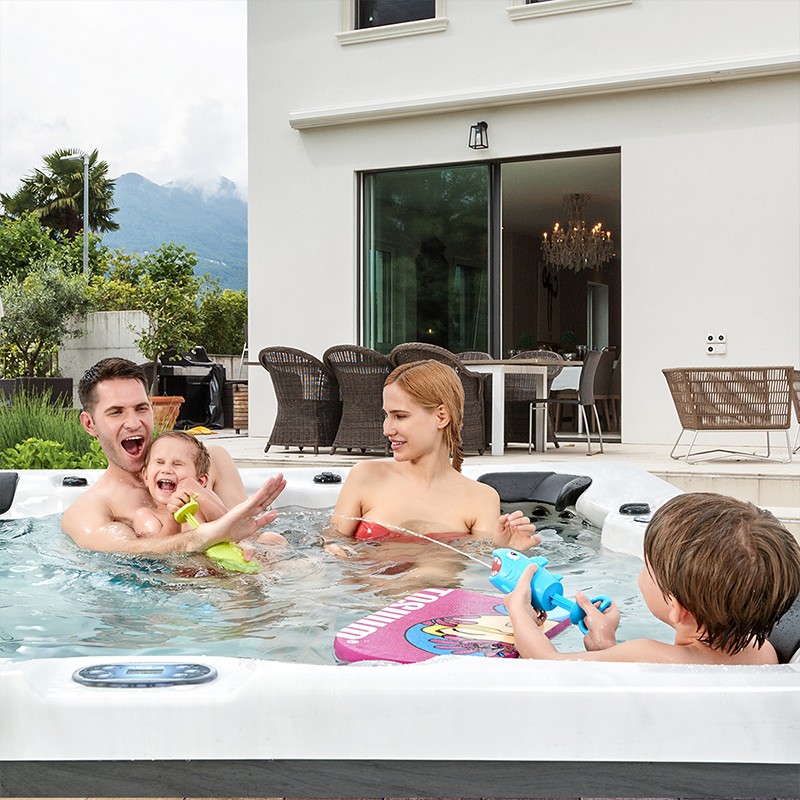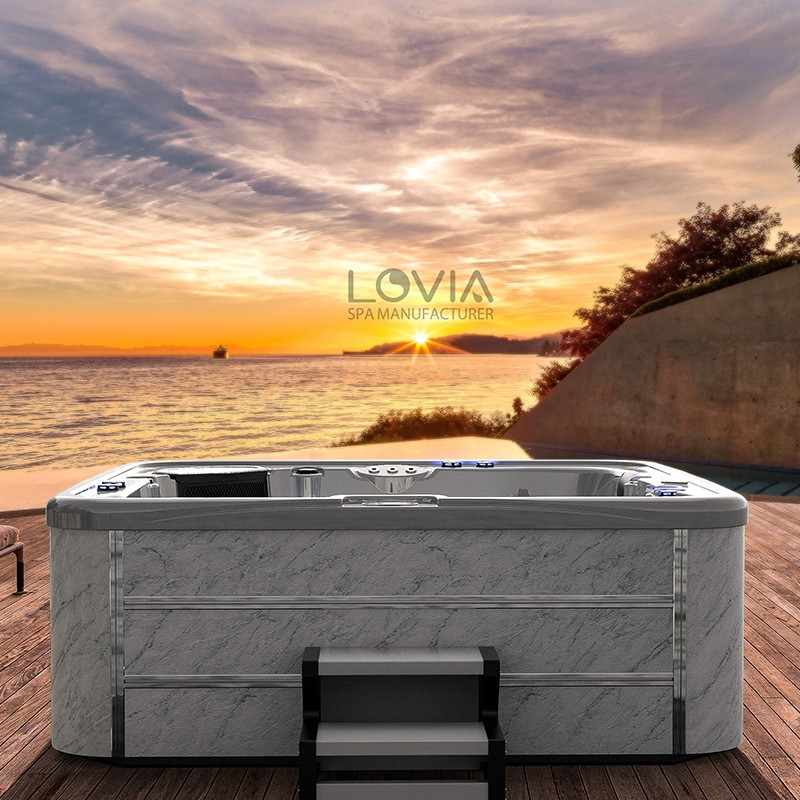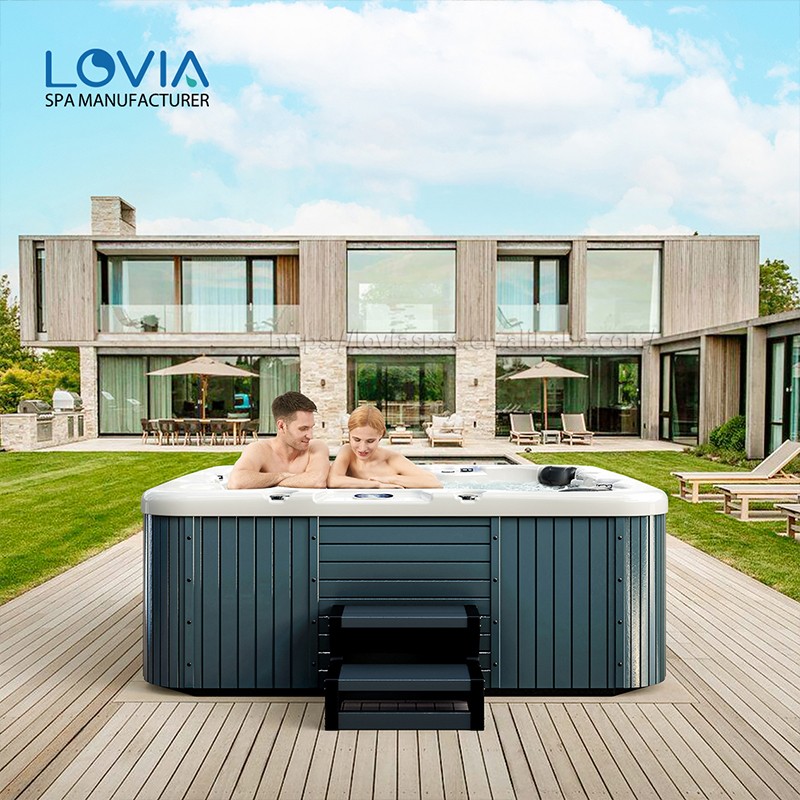
Is the spa massage bathtub made of acrylic corrosion-resistant?
2025-05-01 15:30The spa massage bathtub not only provides a comfortable spa experience, but also has multiple functions of fitness, relaxation and rehabilitation. Spa massage bathtubs are often made of a variety of different materials, and acrylic, as one of the common materials, is widely used in the manufacture of bathtubs due to its excellent physical properties. Whether the spa massage bathtub made of acrylic is corrosion-resistant is one of the issues that many consumers are concerned about.
As a device that is in contact with water, air and chemicals for a long time, the corrosion resistance of its material directly affects the service life, maintenance cost and water quality. This article will discuss in detail the corrosion resistance of the spa massage bathtub made of acrylic, analyze its characteristics, advantages and potential problems, and provide relevant maintenance suggestions to help consumers better understand this issue and make reasonable choices.

What is acrylic?
Before discussing whether the spa massage bathtub made of acrylic is corrosion-resistant, we first need to understand the basic characteristics of acrylic. Acrylic, also known as plexiglass, is a synthetic resin material with excellent transparency, weather resistance, plasticity and high strength. Acrylic spa massage bathtubs are widely used due to their unique characteristics.
1.1 Transparency of acrylic
A notable feature of acrylic is its transparency. Acrylic is lighter and more impact-resistant than traditional glass, making it very suitable for making spa massage bathtubs. The transparent design of the bathtub not only enhances the aesthetics, but also provides users with a better visual experience.
1.2 Good weather resistance and UV resistance
Acrylic has strong weather resistance and can withstand different climatic conditions, especially in outdoor environments. Even in high or low temperature environments, acrylic can maintain stable performance.
1.3 Plasticity and processability
Acrylic has good plasticity and processability and can be processed into various shapes. For spa massage bathtubs, manufacturers can make acrylic materials into complex curved shapes, special-shaped designs, etc. as needed to meet different aesthetic and functional requirements.

Is the acrylic spa massage bathtub corrosion-resistant?
Next, we will focus on whether the acrylic spa massage bathtub is corrosion-resistant. Corrosion resistance is one of the important indicators for evaluating bathtub materials, especially for equipment such as spa massage bathtubs that are exposed to water, chemicals and the external environment for a long time.
2.1 Corrosion resistance of acrylic itself
Acrylic, as a plastic material, has relatively strong corrosion resistance. It has good resistance to water, moisture and common chemicals (such as detergents). This is because the molecular structure of acrylic is relatively stable, and it is difficult for foreign substances to penetrate its surface. Therefore, even if it is exposed to water for a long time, it is not easy to chemically react or corrode.
However, acrylic is not a completely corrosion-resistant material. Some highly corrosive substances such as strong acids, strong alkalis and certain solvents may affect the acrylic surface. When exposed to these substances, especially in a high temperature environment, acrylic may change color, age or even crack.
2.2 Use environment of spa massage bathtub
For the acrylic material of spa massage bathtub, it must not only withstand water erosion, but also deal with factors such as salt, chlorides and temperature changes. Most spa massage bathtubs use water sources that contain a certain amount of chemicals, such as chlorine or other disinfectants, to keep the water clean and hygienic. These chemicals may have a certain impact on the acrylic surface during long-term use, especially when the bathtub water is not clean, the chance of corrosive substances coming into contact with acrylic increases.
However, the surface of acrylic is relatively smooth and it has good anti-fouling properties, so if it is cleaned regularly and the water is kept clean, the corrosion resistance of acrylic can still be well guaranteed.
2.3 Effects of chlorine and salt
Spa massage bathtubs usually use chloride to disinfect water. Chlorine is a strong oxidant. Although it can effectively kill bacteria, it also has a certain corrosive effect on the material of the bathtub. Long-term contact with high-concentration chlorine water may cause yellowing, surface aging or cracking of the acrylic surface. Especially in direct sunlight, the effect of ultraviolet rays accelerates the aging process of acrylic, which may cause its transparency to decrease.
Salt water is also one of the corrosive substances that spa massage bathtubs may come into contact with, especially in coastal areas or places where salt water pools are used. Salt corrodes acrylic slowly, but it may cause some damage to the bathtub over time.
2.4 Effect of temperature
Changes in water temperature will also affect the corrosion resistance of acrylic. The water temperature in the spa massage bathtub is usually kept between 38-40 degrees Celsius. The increase in temperature may accelerate the reaction between the chemicals in the water and the bathtub material. If the water temperature is too high, long-term use may cause aging and fragility of the acrylic material, thus affecting its corrosion resistance.

How to maintain the corrosion resistance of the acrylic spa massage bathtub?
Although the acrylic spa massage bathtub has a certain corrosion resistance, regular maintenance is essential to ensure the long-term use and appearance of the bathtub.
3.1 Regular cleaning
In order to prevent chemicals, dirt and other substances in the water from corroding the spa massage bathtub, regular cleaning is necessary. Use a soft cleaning cloth or sponge with a mild detergent for cleaning, and avoid using rough cleaning tools or strong acid or alkali detergents to avoid damage to the acrylic surface.
3.2 Control water quality
Maintaining the cleanliness and stability of spa massage bathtub water is an important part of preventing acrylic corrosion. Use an appropriate amount of disinfectant, such as chlorine or ozone, and regularly test the pH value and chlorine content in the water to ensure the suitability of the water quality and avoid excessive chemicals in the water, which may cause corrosion to the bathtub material.
3.3 Prevent sun exposure
Long-term ultraviolet exposure may accelerate the aging of acrylic. Therefore, when not in use, the bathtub should be kept away from direct sunlight as much as possible. If the spa massage bathtub is placed outdoors, consider using facilities such as sunscreen or awnings to reduce direct sunlight.
3.4 Temperature management
Excessive water temperature will have a negative impact on acrylic materials, so pay attention to the heating system of the spa massage bathtub to avoid excessive temperatures. Generally, it is ideal to keep the water temperature between 38 and 40 degrees Celsius.
Looking for a reliable spa manufacturer with over three decades of experience? Established in 1989, Lovia Spa by Guangzhou Huan Tong Industrial Co., Ltd. offers high-quality outdoor spa massage bathtubs and swim spas at competitive wholesale prices. As one of China's top 5 spa brands, we provide customized OEM & ODM solutions and guarantee all our products meet global certifications like CE, ETL, and ISO9001. Contact our factory today for discount offers and direct purchasing quotes.
